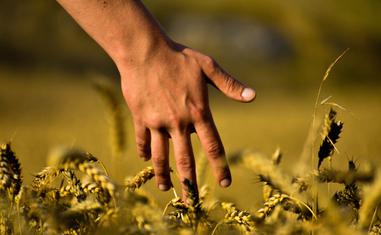The views expressed in our content reflect individual perspectives and do not represent the authoritative views of the Baha'i Faith.
In the second part of this interview with the Baha’i environmental writer Paul Hanley, we delve into some of the ways past economic injustices against Indigenous peoples can be remedied and rectified.
Q: Paul, your nonprofit organization, the Prairie Food System Vision Network (PFSVN), just won a prestigious Rockefeller Foundation Prize. In your work with that organization, attempting to apply spiritually-informed economic principles to the production of food on the Canadian prairies, how do you begin to answer the questions of past injustices and build from the grassroots?
A: I think it is important to listen openly to people and enter into conversation with a sense of humility and good will.
Another thing is looking at the concept of emergence; in any complex system, new elements will emerge spontaneously, and so we are looking at what has emerged in our part of the world that is starting to answer some of these questions.
We created a document called Signals and Trends to record what we are seeing that is already starting to address these questions in this deeper way, and we found about fifty signs that people are already contributing the elements we needed for a new approach. We realized that if we could take those and amplify them in our region, we’d have many of the elements of a new approach to food systems. So that concept of emergence has been very significant for us in our discussions and consultations so far, and it is really important because in a sense we don’t have to create from scratch.
RELATED: Transforming Colonial Legacies and Building a New Economy
So far, we’ve relied on this Cree Indigenous concept: kwayēskastasowin wâhkôhtowin. Wâhkôhtowin means the interrelatedness of all things, and kwayēskastasowin means setting things right.
Of course, the North American continent is a colonized place. When Europeans and others began to migrate to North America, Indigenous peoples had lived here for thousands of years. Those invasive colonial forces tore apart entire Indigenous societies and ways of life, in what was one of the largest genocides in human history. In the process, much that had value was disregarded – especially the unique wisdom the Indigenous peoples had developed in regard to living on the land.
So, we’ve pondered, how do we set things right by recognizing the interconnectedness of all things, all peoples, and the entire landscape? How do we learn to become relatives again?
That is where the consultative process comes in, as the Baha’i teachings suggest. In a speech he gave in Chicago in 1912, Abdu’l-Baha briefly outlined this process as a method for truth-seeking:
… consultation must have for its object the investigation of truth. He who expresses an opinion should not voice it as correct and right but set it forth as a contribution to the consensus of opinion, for the light of reality becomes apparent when two opinions coincide. A spark is produced when flint and steel come together. Man should weigh his opinions with the utmost serenity, calmness and composure. Before expressing his own views he should carefully consider the views already advanced by others. If he finds that a previously expressed opinion is more true and worthy, he should accept it immediately and not willfully hold to an opinion of his own. By this excellent method he endeavors to arrive at unity and truth.
In that spirit, we’re attempting to build a solution hub where we generate the spiritually-informed discourse that will contribute to change and provide support for various constructive efforts that emerge.
Q: Can you give us some examples of emergence?
A: One of the things that was quite significant in building our vision was looking at the grid system that had been imposed on the prairie region. In the 1870s Canada’s Dominion Land Survey divided the whole landscape into square-mile sections of land – with no regard for the natural landscape or the people that lived there. It’s a concept that comes from the industrial model, in order to create an efficient system for extracting and marketing grain.
If you fly over the Canadian prairies today, you see that grid system is dominant – but you also see the movement of water, this fibrous landscape beneath it. So that imagery of the curves of the Earth and movement of water is alternative imagery to the rigid grid, and we see this idea where the grid could sort of fade away and the natural movement of water and species on the landscape restored.
Here’s one example of how that could happen. Everywhere along this grid there are “road allowances,” spaces set aside for a road, but not always used for that purpose. So one of the things that came to mind was to naturalize these unused road allowances, because one of our goals is to create more diversity to allow native species of plants and animals to coexist with farming systems. While that seemed a good idea in theory, initially it seemed impractical. Then we discovered there’s already an organization working on actualizing that concept—it’s one of those emergent solutions. If you apply it on a large scale, there are thousands and thousands of miles of unused roadways that could be restored to native species, creating a connected network of “re-wilded” land throughout the region. We intend to bring concepts and groups like that into the conversation in the solution hub, and attempt to unify all these elements in a bigger conversation.
Q: These concepts are really in alignment with Baha’i teachings – how has the Faith been influential for you on a personal level as you rethink the food system?
A: As we were articulating this vision, one of the things we did was create systems maps that brought all the concepts together. If we wanted to bring about a deep cultural change in our society, we had to have processes for people to come together and consult, incorporating a deeper spiritual perspective, perhaps praying together as part of the process. We needed to start teaching our children moral principles that are consistent with this vision, to engage youth in this process as the rising generation, and to engage people in studying alternatives in depth. So it seemed that all the core activities we use in Baha’i communities were entirely relevant to transformative processes relative to the food systems .
A spiritual element works because Indigenous people always incorporate it. We live in a very secular society in the prairies. When you have gatherings nobody would ever consider including prayer. However, if there are Indigenous people involved the elders will say a prayer and maybe there will be a ceremony. The new respect for Indigenous culture has opened a door for people to see prayer as a normal part of consultation. It has also opened a door to the recognition of the Creator as part of the vision.
When you put it all together by incorporating all these ideas, a lot of them corresponding with Baha’i concepts and practices, it just makes sense. A number of people have said to me that they have looked at our system map and vision and it made them cry and well up with emotion, because it resonates with people at a deep level. This is what I had hoped for – developing a broad, inclusive vision that includes all of these concepts and addresses injustices, inequities, and lack of sustainability. It is not just about the food system – it is much bigger than that. As the Baha’i teachings say, it is about the unity of the human family:
… the five continents of the earth have virtually merged into one. And for everyone it is now easy to travel to any land, to associate and exchange views with its peoples, and to become familiar, through publications, with the conditions, the religious beliefs and the thoughts of all men. In like manner all the members of the human family, whether peoples or governments, cities or villages, have become increasingly interdependent. For none is self-sufficiency any longer possible, inasmuch as political ties unite all peoples and nations, and the bonds of trade and industry, of agriculture and education, are being strengthened every day. Hence the unity of all mankind can in this day be achieved.
Q: Thank you so much, Paul! It is truly incredible to see how the Prairie Food System Vision Network brings together diverse peoples of all backgrounds to articulate a unified vision for the future, and it will be exciting to see this vision become a reality. The Network has already joined a second initiative, the Food System Game Changers Lab, and is potentially receiving long-term funding that will assist in bringing their vision to fruition. Their efforts serve as a reminder of our charge to act on a new set of spiritual principles and values to create what Paul refers to here as “emergent solutions.” By translating cultural change and spiritual principles into action, we can begin to envision and build a better economy, one that benefits all of the members of the human family.

















Comments
Sign in or create an account
Continue with Facebookor